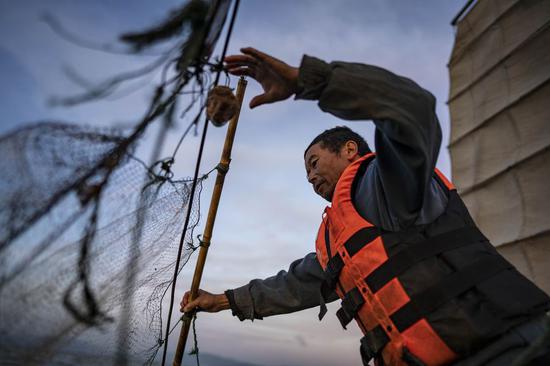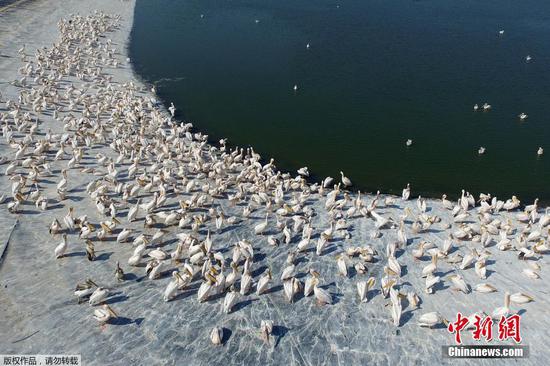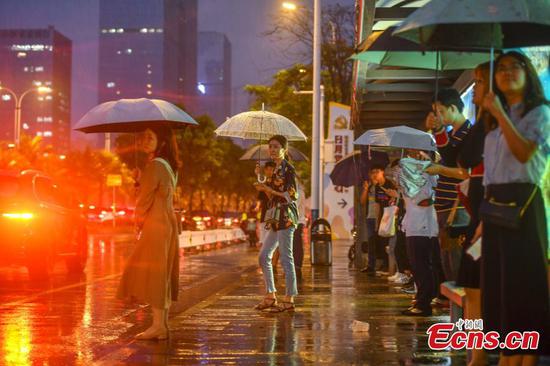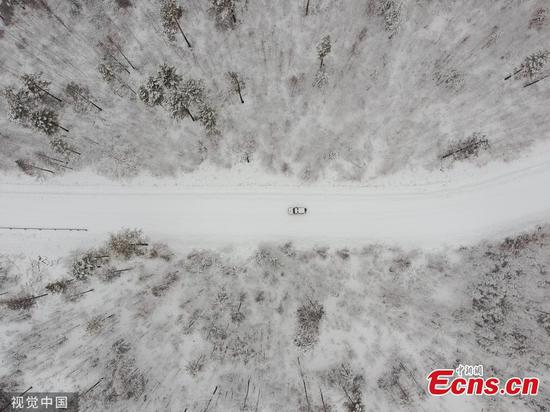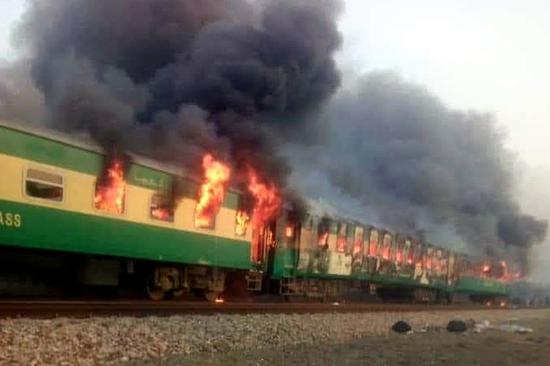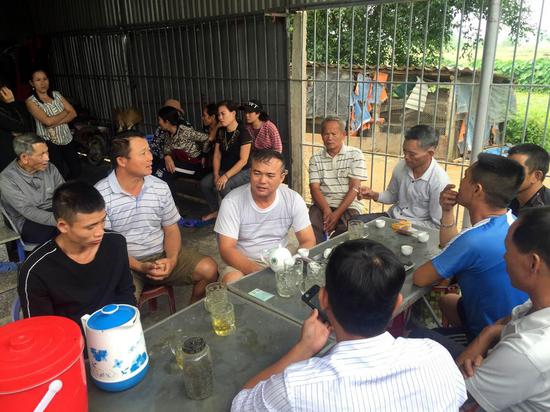
Relatives gather to encourage a family who fear their missing daughter perished in the Essex lorry in Nghe An province, Vietnam, on Oct. 26, 2019. (VNA via Xinhua)
Such grief and some sort of regret are now prevailing across Vietnam among all walks of life. Both officials and ordinary people are getting to know more about the motives of illegal immigrants, mulling over tightening labor export management, and combating human trafficking in order to prevent the recurrence of the lorry death tragedy.
After British authorities' confirmation of Vietnamese victims among the 39 dead in Essex lorry, organizations and individuals in Vietnam have dug into underlying causes of illegal immigration, as well as measures to bolster labor export management and combat human trafficking, so as not to repeat the tragedy.
Vietnamese Prime Minister Nguyen Xuan Phuc has sent a message of condolences to the families of victims and requested sending ministerial working groups immediately to Britain following news of Essex lorry victims being Vietnamese nationals, according to a statement released on Sunday on the Vietnamese government portal.
On Oct. 23 in the British county of Essex, local police found 39 bodies, including eight women and 31 men in a refrigerated lorry container. On Nov. 1, British police said that the 39 migrants are believed to be Vietnamese nationals.
Immediately, the Vietnamese Ministry of Foreign Affairs stated that it is a serious humanitarian tragedy. It strongly condemned human trafficking, and hoped the British side would soon complete investigation on the case.
Following reports of families in Vietnam's central Ha Tinh province seeking for their missing relatives in Britain, the provincial police have detained two people, including one accused of organizing and brokering illegal immigration and residence in foreign countries.
"It's truly heart-broken to hear the news that the victims are our fellows who were fooled to go there and die. They made the wrong decisions but it's all for a better life of their family and themselves," Do Van Thai, a 31-year-old purchasing manager in the capital city of Hanoi, told Xinhua on Sunday.
Le Thi Hanh, a 26-year-old digital marketing executive in Hanoi, compared the immigrants' tragic journey to Britain to a bloody gamble. "Not having enough information and being easily tempted to choose an illegal path, they had to pay not only money but also their lives," she said.
The deadly path to Britain was highlighted through talks among family members of a 26-year-old man named Nguyen Dinh Tu from central Nghe An province and his relatives, neighbors and local officials late last month.
According to their talks, Tu, the youngest among five siblings, completed secondary education, joined the army, came back to his hometown to get married and then had two kids. Recently, he borrowed money to build a one-story building, and chose to go to Britain to work to pay back the debt and better support his family.
But his family is now fearing that he will never return home alive. His wife has been admitted to a local hospital due to grief. Before being hospitalized, she told local media that her husband had to pay a total fee of nearly 800 million Vietnamese dong (nearly 34,800 U.S. dollars) for being taken to Romania, Germany, France and Britain to work as a migrant worker.
"If I had known he was going to use an illegal service to get to England to work as a guest worker, I would have prevented him from doing that," Nguyen Van Tinh, Tu's elder brother, told Xinhua on Thursday, shaking his head and fetching a sigh.
Such grief and some sort of regret are now prevailing across Vietnam among all walks of life. Both officials and ordinary people are getting to know more about the motives of illegal immigrants, mulling over tightening labor export management, and combating human trafficking in order to prevent the recurrence of the lorry death tragedy.
There are several major causes leading to illegal immigration, including the natural-geographical environment, the family environment and the social environment, and one cause brought by the law violator himself or herself, Do Thanh Truong from the Supreme People's Procuracy of Vietnam was quoted by Vietnam News Agency as saying.
Limited economic conditions, stemming from such factors as unfavorable population characteristics, poverty rate, human resource quality and geographical location, are the underlying causes of law violations, including going abroad at all costs and making money by all means, Truong stated.
His statement was echoed by Mark Brown, head of the Office of the International Organization for Migration (IOM) in Vietnam, who said that the most common reason for Vietnamese people to try illegal migration is the economic one.
In 2017, IOM interviewed a sample of Vietnamese nationals who returned from Britain. Most said they left because of the economic pressure, and some also mentioned family pressure to migrate, a desire to escape domestic violence and/or divorce, debt problems, and other domestic issues, daily newspaper Vietnam News quoted Brown as saying.
Le Quy Nguyen, general director of RC Company in central Da Nang city, specialized in construction and labor export, told Xinhua recently that many are willing to take risks migrating illegally because they see or hear about countrymen or countrywomen who have successfully entered Europe through unofficial ways, or they are deceived by brokers who promise them well-paid jobs in developed countries.
A 47-year-old man, named Duong Van Thanh in Hanoi, is a case in point. Thanh, who went to Germany in 2001, told Xinhua recently: "We flied to Russia and illegally crossed borders to reach our final destination. I was told by the brokers that it would take only one week to get to Germany, but it turned out to be three perilous months."
Therefore, relevant agencies are considering more effective measures to punish human traffickers and other law-breakers; enhance public awareness about abiding by laws, including lawfully going to work overseas; and tighten socioeconomic management with better control of labor export services.
The Ministry of Labor, Invalids and Social Affairs has planned to send 120,000 people to work overseas, mainly in Asian countries in 2019, down from 142,860 laborers in 2018. According to the ministry, over 500,000 Vietnamese people are working as guest workers in more than 40 countries and regions, annually remitting home two to 2.5 billion U.S. dollars.











